Photographer Mark McCarty
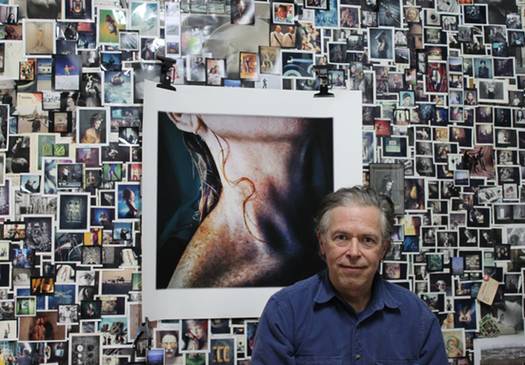
Mark in front of his polaroid wall at his studio in Troy.
Troy-based photographer Mark McCarty captures the details that are often photoshopped out of today's images: wrinkles, blemishes and scars included.
"I have a real problem with the way skin is dealt with these days... where it gets all plastic and perfect -- I don't like it."
Flesh has been a common theme in his photography.
Two of his projects look at that theme in very different ways: one is with Alzheimers patients at the Marjorie Doyle Rockwell Center in Cohoes, the other is his work with colon cancer survivors for an annual "Colondar", which features the scars of those survivors.
"Everyone in the world goes through something that scars them whether it's visible or not, and I think photography is a good medium for exploring that."
I spoke with Mark recently about how he got involved with these projects, their affect on the subjects -- and the effect on him. (Also: a handful of his photos.)
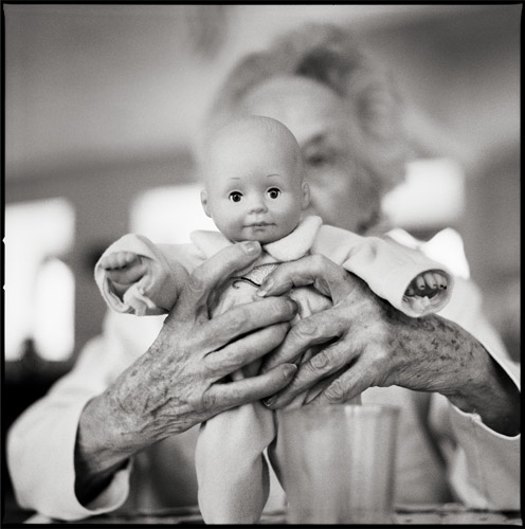
How did you get involved with the Alzheimer's project? Is it something that's personal for you?
I ran into another friend who said, "You really ought to see where my aunt is staying right now -- it's an Alzheimer's facility. The faces are amazing and it's got a great vibe. The director of the place is really cool and she'd probably let you photograph there." And I said, OK, well when can we go?
It's one of those things that everybody knows somebody that has dealt with it, or is dealing with it. It's so pervasive and it's so consuming that when it touches somebody you know, you hear about it.
The director [of the facility] gave the thumbs up and then as I started getting going, she would talk to the families -- some would say, "This is not my mom, this is not the way I'd want the world to see her." Though, most of them were so grateful to the center and sort of wanted to tell the story because it is so all consuming and tragic, that, you know -- they thought the world outta know about it.
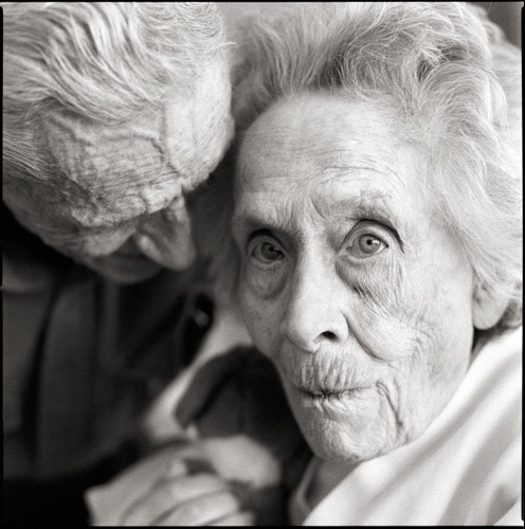
Will you tell me about Bob and Bobbie? Bobbie was the one with Alzheimer's, right?
Bob passed away before Bobbie did. Bob was an Episcopal bishop. He got into a lot of trouble with the church because he was one of the first to push for ordaining women. Bobbie started getting Alzheimers; I'm not sure how they ended up in this area, but Bobbie -- she had pretty severe Alzheimer's. Bobbie always carried a little baby doll. It was her baby -- my interactions with Bobbie were generally with the doll; she'd talk but she wouldn't make any sense. We'd mostly pass the baby back and forth and I'd make the baby dance and she'd like that. It was generally communication without sentences. I really loved Bobbie; she was neat.
Bob was very eloquent -- it was a touching relationship because he was there often -- always exchanging touch.
What did Bobbie think of the camera?
Generally, she didn't even really notice it. Bobbie was in Bobbie's world.
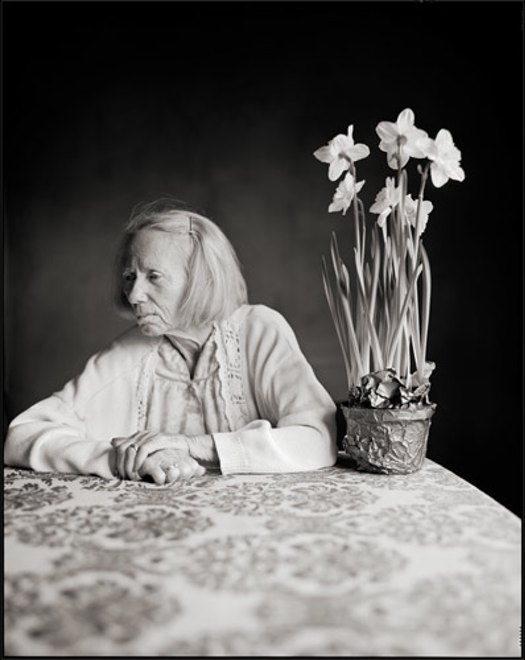
Jean is another woman that was featured. Will you tell me about her?
Jean was a doll; she always recognized me. Sometimes she thought I was her brother -- but everytime I showed up she knew I would take photographs and she was such an amazing subject to photograph. She would do something like that [referring to a photograph] and I would say "Jean that's great -- hold it right there," and at that point, I could have left the room, gone out, had lunch and a cup of coffee and come back 45 minutes later and she still would have been holding the pose.
What was the impact of the Alzheimer's project on you?
It's been a culmination of one of the things that I've always been interested in and that is what makes us human and to me one of the things that makes us human is compassion.
Let's face it, someone with Alzheimer's would not surivive very long if it weren't for a lot of compassionate people caring for them. I'm interested in what makes us human and with Alzheimer's some of that humanity is stripped away from you. So much of your memory, so much of who you are -- it's out the window, or on its way out the window and yet there is still a thinking, breathing, feeling human being in there and I was interested in ... what's at the core in that.
How about the Colondar?
One of the things with the Colonder is showing off the surgical scars and a lot of my work is about flesh and about our scars and with the Alzheimer's, what makes us who we are. Everyone in the world goes through something that scars them, whether it's visible or not and I think photography is a good medium for exploring that.
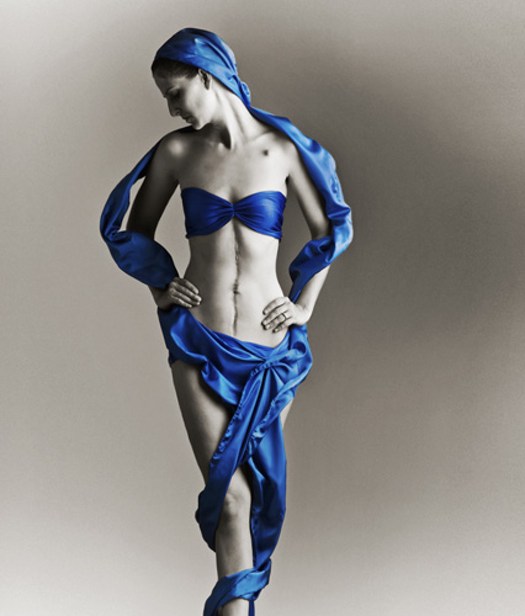
How did the Colondar shoot work?
The experience of the shoot is pretty spectacular, it was started by this woman, Molly McMaster -- she's a native of Glens Falls. Her parents have this beautiful house on the end of Lake George and it's this intense week of being photographed and everyone telling their stories and everyone just stays up late and they're all young colon cancer survivors.
Generally, when they went to their doctor they would hear, "Well, if you were 50 or 60 I'd say you have colon cancer, but you're too young for that so we'll look for other things." A lot of them were misdiagnosed for a long time until finally they said, "You're too young to have colon cancer, but maybe you have colon cancer."
So, until they get to this photo shot, most of them have never talked to anyone their own age who has been through what they have been through. So it's this incredibly cathartic experience; it's -- I always liken it to being in a life boat after a shipwreck with a bunch of strangers that you get to know more intimately and better than you've known anybody your entire life -- all the emotions are out there on the surface and nobody is holding anything back and it's just a spectacular time that in a way.
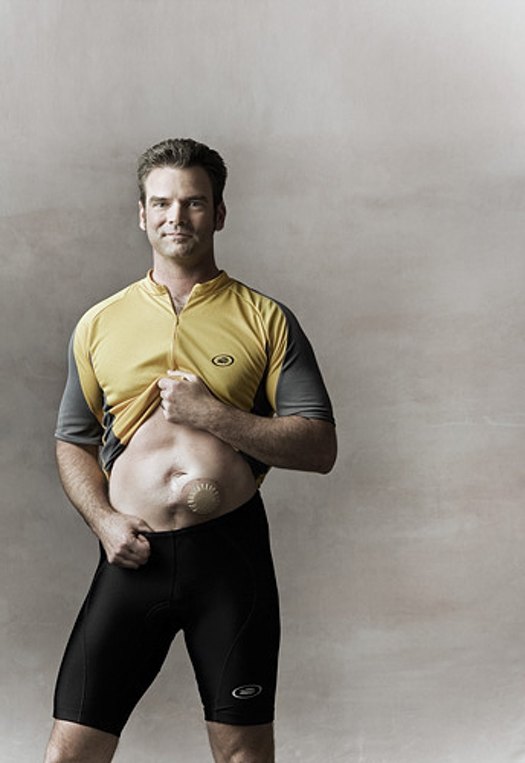
Were you always a photographer?
This has always been my job -- I am the luckiest man alive. I was an English major in college, but spent my college years hanging out with the wrong crowd -- all of these deadbeat painters and video artists and writers and things like that. I spent a lot of my college nights in the darkroom and when I got out of school looking for a job I was in the right place at the right time. I walked into a job at the State Assembly at the Capitol photographing assemblymen for their newsletters: grip and grin photos, future farmers of America breakfasts, which provided a nice income and taught me how to get up everyday and make pioctures whether you felt like it or not, whether you were feeling creative or not.
I'm from Troy. With the first job I wound up back in the area, much to my surprise -- but after a couple of years at the Assembly, I felt like I was doing an unnecessary job. I felt like I had learned everyting in the job that I was ever going to learn. I could have easily done it for another 10-15 years, but I wasn't going to learn any more. A friend of mine that I met at the assembly, Gary Gold, he sort of said to me, "Mark, there's work out here." There was work: banks were local, there were newspapers, there was a lot of print advertising ... I got work and every job I did I made sure I always tried to exceed what was necessary or expected of me -- that's a short path to getting more work. If every job you do you exceed expectations, people hire you again.
Will you be exhibiting any time this year?
I'll be at the Opalka Gallery at Sage Albany in October 2011. It will be a survey show of my work -- the common thread is flesh. I really wanted to show at Opalka because it's modern; it's a cool piece of architecture.
All images (with the exception of the Polaroid photo) courtesy of Mark McCarty.
Say Something!
We'd really like you to take part in the conversation here at All Over Albany. But we do have a few rules here. Don't worry, they're easy. The first: be kind. The second: treat everyone else with the same respect you'd like to see in return. Cool? Great, post away. Comments are moderated so it might take a little while for your comment to show up. Thanks for being patient.
Comments
Woah. Great photos in this portfolio. A lot of the corporate pics are really original, I wish more companies would offer that much freedom. I like to take pics of the gritty, the textures, the ultra-realistic, so I can very much relate with depicting people's "real" looks.
The Colondar project, impressive, but the Alzheimer project... well I hope to make it to one of Mark's show to talk to him about it. I absolutely believe he has the best intentions, but I had the toughest time reconciling the photos and the interview. When McCarty says "I'm interested in what makes us human and with Alzheimer's some of that humanity is stripped away from you", it made me a bit uncomfortable. My gut feeling is that there is a really fine line where you could consider Alzeihmer's subjects are also stripped from that very same humanity when you take a picture of them for their "amazing faces". Are they going to remember what happened? Aren't these the faces of people who are completely out of it, after all? The concept of doing portraiture of people whose consent you can't be completely sure of is challenging, to say the least.
... said -S on Feb 7, 2011 at 11:47 AM | link
hands down one of the best photographers around here. it was great reading this, thanks AOA. next up is Gary Gold!
... said patrick on Feb 7, 2011 at 12:17 PM | link
Mark's also just a really cool, nice guy. His series using his 8x10 camera is definitely worth a look.
... said jess on Feb 7, 2011 at 1:41 PM | link
Always loved working with Mark. One of the best!! Great to see some of his recent work.
... said Kathy Yanas on Feb 7, 2011 at 3:23 PM | link
Isn't a strange conceit to think that our ownership of ourselves extends as far as the photons bouncing off of our skin?
... said mr slow loris on Feb 7, 2011 at 5:49 PM | link
I have to agree, Mark is one of the best photographers working in the area. I went to visit his studio once or twice with classes... It was a great experience for me.
Hopefully patrick is right, I've been wondering what Gold was up to... :)
... said Andy on Feb 12, 2011 at 12:19 PM | link
The work is a ten...the accompanying commentary is a ten..and it all adds up to thirty. Bravo, Mark, on such stimulating, beautiful work and equally illuminating perspectives. You rock!!
... said Al on Feb 17, 2011 at 10:06 PM | link
I work with Mark on the Colondar. Mark brings such passion to every photo he takes. The models love to work with him, because the very first thing that Mark does is puts everyone at ease and it shows in his photos. Mark is an absolute treasure in our community and truly one of the best photogs you'll find anywhere. Try him out, you will LOVE him. Remarkable!
... said Troy on Mar 31, 2011 at 9:46 AM | link
Mark's work on the Alzheimer's project was truly remarkable. He was able to see and share with us what so few of us know about Alzheimer's and it's effect. Their faces really tell the whole story whether we like or dislike what we see. He did it in a way which makes us all think and maybe that's why it so good. Good going Mark!
... said Jim on Nov 4, 2011 at 4:34 PM | link